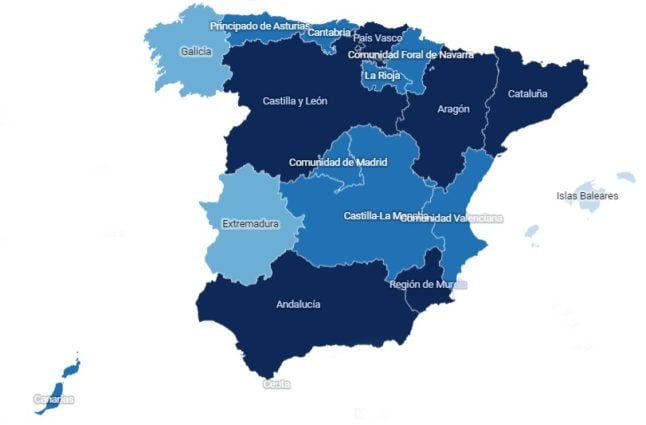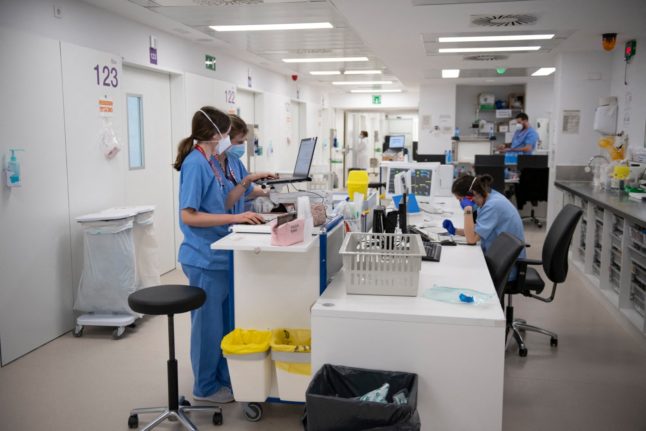There are general rules across the regions that includes exemptions for travelling across regional borders for work or study purposes and you will always be allowed into a territory if returning to primary residence.
Some regions allow exceptions over Christmas for those who are going to visit family, others also include the term allegados, (which means close friends or loved ones) while Catalonia will also visits to second homes and hotels, others do not.
Here’s a breakdown of travel rules within each of Spain's autonomous communities.
Madrid
Spain’s capital is shutting its perimeters between December 23 and January 6 in line with Ministry of Health recommendations. However it will allow people to cross in and out of they are going to visit family or allegados (close friends).
▶️ ¿Voy a poder entrar y salir de la Comunidad de Madrid estas navidades?
Es responsabilidad de todos. #NavidadCM ?pic.twitter.com/z9JU5MpJoc
— Comunidad de Madrid (@ComunidadMadrid) December 19, 2020
Authorities have produced a justification form that travellers must fill in and show at any checkpoint or if stopped by police in order to enter or leave the Madrid Community. DOWNLOAD HERE
Catalonia
Authorities in Catalonia have restricted non-essential movement between comarcas (counties) at all times but exceptions are made not only for the usual work/study/care for vulnerable rules but also for those travelling to a second home or hotel or to return to the family home.
Those wishing to travel between comarcas must fill in a justification form and present it to police if stopped at a checkpoint.
? Certificats autoresponsables per entrar i sortir de la comarca i de Catalunya per la crisi sanitària de la #COVID19 @interiorcat @emergenciescat
? https://t.co/ULWJ0ImkCS pic.twitter.com/1w5Ji3U4ZW
— gencat (@gencat) December 20, 2020
Valencia
The regional government in Valencia has brought in the strictest rules regarding movement within its territory and has closed off regional borders even to those wanting to visit family and close friends.
The only exception beyond those entering for justified work/study etc reasons are those returning to their primary residence.
? Medidas #COVID19 a partir del 21 de diciembre y hasta el 15 de enero
? Confinamiento perimetral
? Circulación nocturna, 23 h (excepto 24 y 31 de diciembre, 00 h)
? Límite 6 personas?? Más detalles ➡️ https://t.co/4uZb0fiBJ6
❔ Dudas en ? [email protected] pic.twitter.com/seOx5KcGFH
— Generalitat (@generalitat) December 20, 2020
Balearic Islands
Travellers are allowed to enter the Balearics only if they can present a negative PCR test taken within 72 hours prior to arrival or they must have an appointment to do so on the island and quarantine while they wait for a negative result.
Andalusia
Restrictions on travelling between provinces in Andalusia has now been lifted but a perimeter closure of the entire region remains in force until at least December 28 when authorities will reassess.
This means you cannot visit Andalusia for tourism purposes but an exception is made under Spain’s Health Ministry guidelines that you can enter or leave if you are going to visit relatives or close friends.
?? Conoce las medidas contra la #COVIDー19 en movilidad, comercio, hostelería, toque de queda y celebraciones durante la #Navidad en #Andalucía. #Andalucía te cuida ? pic.twitter.com/AWF6IiC5wN
— Junta de Andalucía (@AndaluciaJunta) December 18, 2020
Canary Islands
The government of the Canary Islands have decided to ban non-essential travel to the island of Tenerife from Friday December 18th after a recent surge in infections.
Tourists however, both from mainland Spain and abroad, are exempt from the travel ban provided they have accommodation booked and can show a negative Covid-19 test that was taken within 72 hours prior to arrival.
There are no travel restrictions on other islands although all visitors must present a negative Covid-19 test at the airport and at their accomodation. READ MORE HERE
?️Sanidad inicia el control de pruebas diagnósticas de #COVID19 de los viajeros nacionales que llegan a Canarias.
Más del 70% de los viajeros ha presentado el certificado de su PDIA negativa en los mostradores habilitados.
➡️Más info: https://t.co/kYEC8SFF2L pic.twitter.com/iJaR6wqTME
— Sanidad Gobcan (@SanidadGobCan) December 18, 2020
Aragon
A regional border closure is in place until January 12 plus travelling between the provinces is not allowed. An exception is made between the dates of December 23 and 26 and December 30 and January 2 when travelling is allowed for the purpose of meeting up with family only – Aragon has also chosen not to include the term allegados.
Castilla y Leon
The region will remain closed until at least January 10 with exceptions for travel to visit family (not close friends) between December 23rd and December 26th, December 30th and January 2nd and January 5th to January 6th.
Castilla-La Mancha
Regional borders will remain closed over the Christmas period but it will allow make an exception for visits to family and friends between December 23 and January 6 in accordance with Spain's Health Ministry guidelines.
Cantabria
The region has been closed since November 4 and will remain so over the Christmas period but it will allow make an exception for visits to family and close friends between December 23 and January 6 in accordance with Spain's Health Ministry guidelines.
Galicia
The region has no perimeter confinement around the territory but it will do so following national guidelines between December 23 and January 6 except for those visiting family (it did not include the term allegados).
Students are advised to get PCR tests before returning home to family units.
Extremadura
The region is one of the few in Spain which has not imposed a perimeter confinement around the region but it will close its regional borders following national guidelines between December 23 and January 6 except for those visiting family and close friends.
Murcia
The ban on travel in and out of Murcia will only be lifted between December 23rd to 26th and December 30th to January 2nd for those visiting family and close friends.
Basque Country
The ban on travel in and out of the Basque Country will only be lifted between December 23 to 26 and December 30 to January 2 for those visiting family and close friends. Those doing so will have to complete the justification form required by regional authorities HERE
Navarra
The ban on travel in and out of Navarra will only be lifted between December 23 to 26and December 30 to January 2 for those visiting family and close friends.
La Rioja
The ban on travel in and out of La Rioja will only be lifted between December 23 to 26and December 30 to January 2 for those visiting family and close friends.
Look at the interactive map produced by the Spanish Health Ministry for details on restrictions in individual regions.
READ ALSO:




 Please whitelist us to continue reading.
Please whitelist us to continue reading.
Member comments